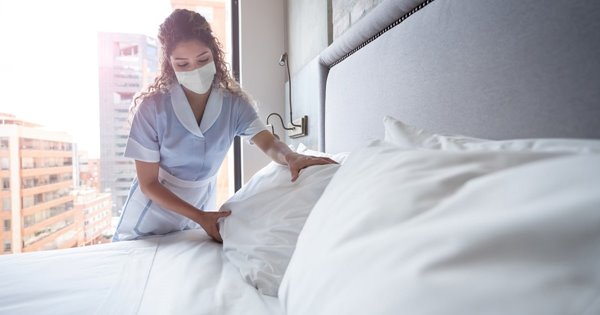Summary: The hotel industry has been hit hard by the coronavirus as business travelers and tourists stay close to home. In this article, find out how the hospitality industry is evolving with the changing needs of their customers during the pandemic.

The coronavirus has dramatically impacted the hospitality and travel industry. The pandemic forced small hoteliers, big hotel chains and resorts to shut down in the spring and adapt their businesses when they reopened in early summer. Today, the hospitality industry adjusts to their customer needs, focusing on
workplace safety measures, new offerings and updates to their service model.
The good news is that
hotel occupancy rates continue to improve to nearly 50% occupancy compared to an average of 20% in the height of the spring shutdown. Unfortunately, on the negative side, there have been worker furloughs and layoffs. Industry experts say that it could take years for the hospitality and travel industry to
recover to the occupancy levels they experienced in 2019.

Coronavirus Impact on the Hotel Industry
U.S. travel and tourism destinations, such as New York City, Las Vegas,
Los Angeles and San Francisco, have been hit incredibly hard due to the coronavirus pandemic. Hotels in New York City face difficulties from the reduction in tourist visits and the closure of Broadway theaters. Hilton recently announced that their Times Square location is closing due to low occupancy. CNBC found that
34% of NYC hotels are delinquent and predicts that more are at the risk of closing.
A recent
American Hotel & Lodging Association (AHLA) member study has some stark findings. Their survey detailed that 68% of hotels have less than half of their pre-COVID-19 staff levels, and without additional governmental financial support, 74% of those surveyed said there would be more staff reductions. Half of the hotel owners said they are in danger of foreclosure due to COVID-19. Additionally, sixty-seven percent of hotel owners reported that they would only be able to last six more months at their current revenue and occupancy levels without additional government relief.
Amusement and theme parks across the country have also been impacted due to coronavirus shutdowns and then reopening. Disney, the owner of two of the biggest theme parks in the United States, just announced that they are
laying off 28,000 workers from their parks division in both Florida and California. The majority of those laid-off are part-time workers.
Hotel Industry COVID-19 Safety Guidelines
The hospitality industry has always made cleaning a top priority. Still, due to coronavirus, even
stricter guidelines have been put in place to ensure the guests' and employees' health and safety. On top of social distancing reminders, readily available hand sanitizer in common areas and other cleaning measures, Marriott Group has launched its
Global Care & Cleanliness Commitment, focusing on staff and guests’ safety and well-being.
Hilton’s CleanStay program, a collaboration with RB, the maker of Lysol, and the Mayo Clinic, focuses on delivering a higher standard of cleanliness and disinfection in Hilton properties. Boutique and smaller hotels have implemented more robust cleaning programs, while also adjusting their services to better meet their customers’ needs.
How Can the Hospitality Industry Reinvents Itself During COVID-19?
It may take several years for the hotel industry to recover from the pandemic's economic side effects. The industry had to evolve quickly to meet their client’s needs. It is a slow process, but there are bright spots as hoteliers look at new strategies, cleaning methods and marketing to ensure their customers have the best and safest experience.
Some of the techniques hotels can implement to ensure their survival and growth include:
- Invest in technology: The Centers for Disease Control and Prevention (CDC) recommends utilizing mobile apps for actions like check-ins and checkouts, payments and contactless room service orders.
- Apply for grants and funding programs: As the federal government’s Paycheck Protection Programs (PPP) and other funding programs end, hotel owners should consider applying for local grants and relief loans where available.
- Communicate safety and cleanliness procedures: Create workplace safety and cleanliness programs if you haven’t already. Promote these programs via all marketing channels.
- Make repairs: Do an inventory of items that need to be fixed or removed and upgrade outdated equipment and systems.
- Be creative: Research newer revenue opportunities, such as loyalty programs, to see if they could work for your business and customers.

AmTrust is Here for Our Hospitality Insureds
Hotels are one of AmTrust’s preferred classes. AmTrust is
here to help with information, tips,
coronavirus resources and more to ensure our small business insureds stay informed, safe and healthy. For more information about our
small business insurance solutions, please
contact us today.
This material is for informational purposes only and is not legal or business advice. Neither AmTrust Financial Services, Inc. nor any of its subsidiaries or affiliates represents or warrants that the information contained herein is appropriate or suitable for any specific business or legal purpose. Readers seeking resolution of specific questions should consult their business and/or legal advisors. Coverages may vary by location. Contact your local RSM for more information.